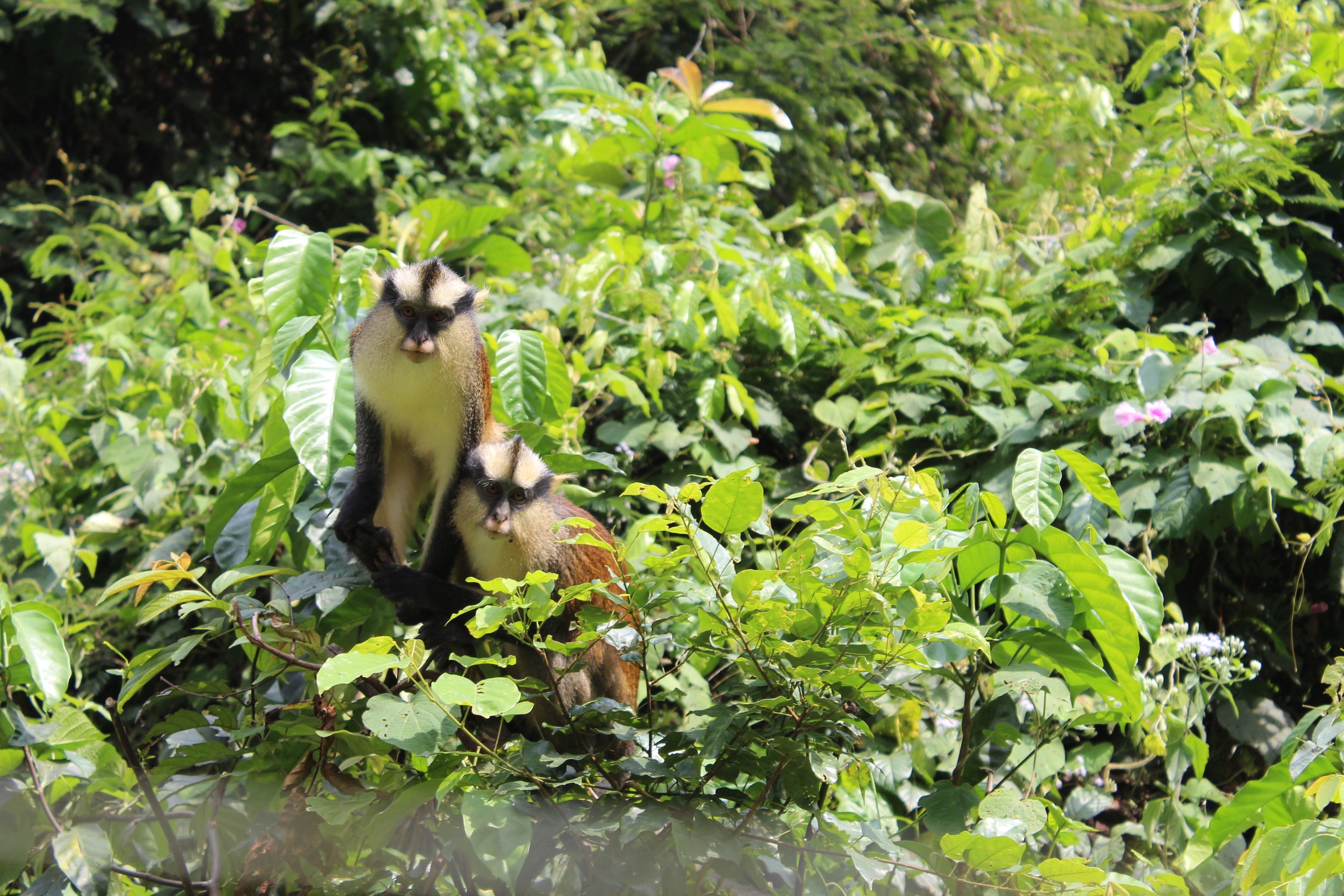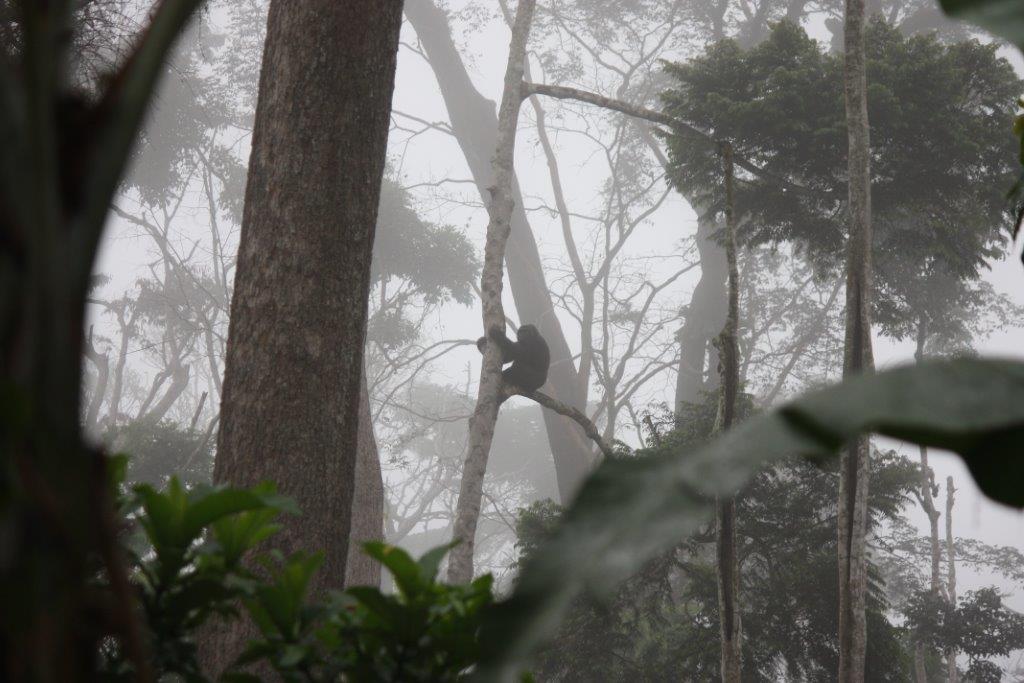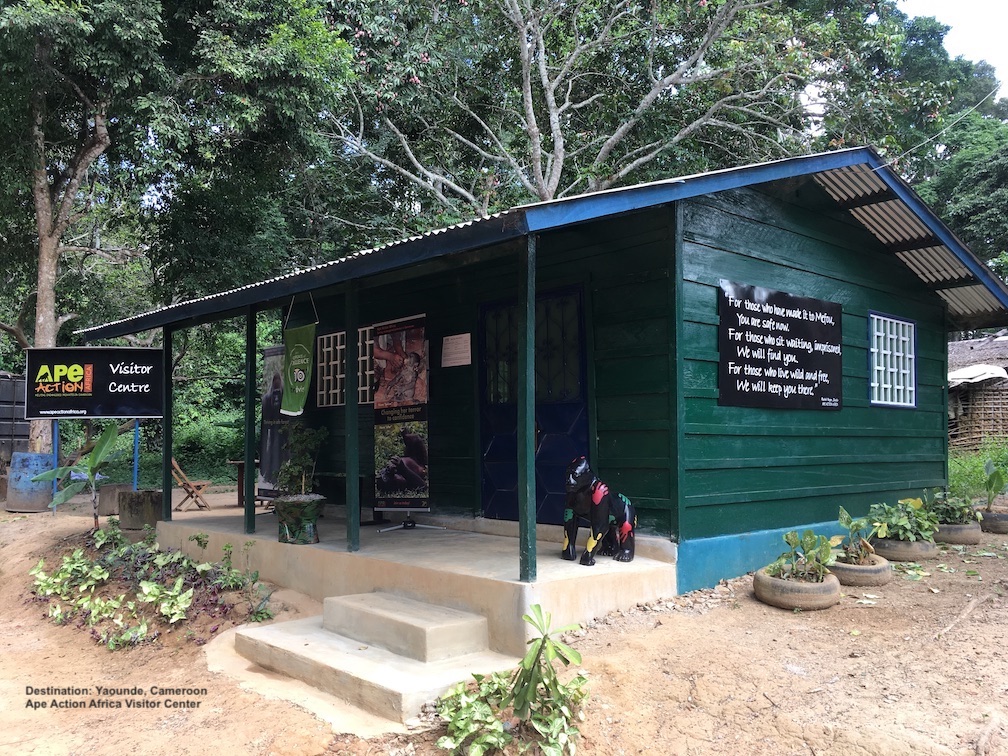Inspired By Orphans, The Passionate Art of Saving Primates
PORTRAIT OF YODA, A TALAPOIN MONKEY. THIS IS ONE OF THE MANY ORPHANED AND TRAUMATIZED BABY PRIMATES RESCUED AND RAISED AT APE ACTION AFRICA. PAINTING BY ©ROBIN HUFFMAN, ACRYLIC ON LINEN 36 x 48
Wildlife conservation has many faces; sometimes those faces are of baby monkeys lovingly painted on large-scale canvases.
Two Human Lives Changed by Traumatized Baby Primates
✔︎Trip Tips
What: Ape Action Africa,
Primate sanctuary
Where: Cameroon, Africa
What: Volunteer Opportunity
This is this story of two women whose lives were each changed by a meeting with a single baby primate. These were not just any monkeys or apes; these were orphaned infants in crisis. Their mothers were killed, probably for bush meat. These babies and a myriad of others, witnesses to violence, traumatized and alone, were discovered in the bush, or chained or caged for sale in a market, or rescued from captivity as a “pet,” and in some cases, delivered by compassionate strangers. For many, death was only days, or hours away.
RACHEL HOGAN, DIRECTOR, APE ACTION AFRICA
RACHEL HOGAN AND N’KAN DANIEL, THE RESCUED WESTERN LOWLAND GORILLA THAT ALTERED THE COURSE OF HER LIFE. PHOTO FROM 2005. IMAGE: ©IFAW WITH THANKS TO APE ACTION AFRICA FACEBOOK.
Rachel Hogan, a UK native, went to Cameroon in 2001 as a 3-month volunteer at the Cameroon Wildlife Aid Fund, the precursor of Ape Action Africa. As her stint reached its final days, a tiny two-week-old gorilla was brought in. No infant gorilla, small as this one was, had ever been raised successfully in captivity. As she held him, Rachel promised that baby he would not be abandoned again, she would stay until he had a proper forest home and a new gorilla family. Then, she unpacked.
APE ACTION AFRICA DIRECTOR, RACHEL HOGAN. RACHEL FOUND HER LIFE’S PASSION SOON AFTER SHE ARRIVED AS A VOLUNTEER FOR A THREE MONTH STINT IN 2001. IMAGE:©GERRY ELLIS /APES LIKE US
Two years and many rescued primates later Rachel was named manager. Then in 2010, the unthinkable happened; Ape Action Africa’s dynamic co-director and Rachel’s mentor, Avi Sivan, was killed in a helicopter crash. And so began Rachel Hogan’s life as director of one of the largest facilities for orphaned apes and monkeys on the continent.
ROBIN HUFFMAN, WILDLIFE ARTIST
ROBIN HUFFMAN AND FRIDA, A JUVINILE PATAS MONKEY. ACRYLIC ON CANVAS. IMAGE THANKS TO© ROBIN HUFFMAN
In 2007, Robin Huffman was a successful interior designer and project manager for a global architecture and design firm, but after a 30-year career, she was seeking more. Deciding it was time to act on her love of gorillas she googled volunteer opportunities, and up popped an application for the Cameroon Wildlife Aid Fund. Robin was accepted and set off for Africa for a three-month stint.
IT WAS A LIFE-ALTERING LOVE-AT- FIRST-sight-MOMENT WHEN ROBIN HUFFMAN MET THE FRIGHTENED ORPHANED INFANT NAMED MAASAI, A tiny MUSTACHED GUENON. IMAGE: ©ROBIN HUFFMAN.
Falling in Love, Discovering a Life’s Work
Robin may have gone to Cameroon to be near gorillas but, in her own words:
I fell in love with a monkey… a fragile, frightened blue-faced infant, [a mustached guenon] who fit in the palm of my hand. Her name was Maasai. It was 2007, and I was volunteering for the first time at Ape Action Africa [at the time it was still called CWAF, the Cameroon Wildlife Aid Fund] primate sanctuary in Cameroon. My job was to care for her. When she looked up at me, I knew life would never be the same.
Robin Huffman, Art for Wildlife Conservation
Although Robin was a designer, she had never seriously painted before being asked by Rachel if she could “paint a monkey” for a sign at the sanctuary. She did; it was her first step on her life's new path.
Ape Action Africa: Why Should We Worry About Primates?
JO-ANNE MCARTHUR WON THE PEOPLE’S CHOICE AWARD OF THE 2017 WILDLIFE PHOTOGRAPHER OF THE YEAR COMPETITION FOR HER IMAGE OF CAREGIVER, APPOLINAIRE AND HIS CHARGE, THE YOUNG WESTERN LOWLAND GORILLA, PIKIN. IMAGE: ©JO-ANNE MCARTHUR / WE ANIMALS
According to a study published in 2017 by 31 primatologists, 60% of primate species populations worldwide are threatened with extinction, 75% have declining populations. One species, the Cross River Gorilla, found only in a small section of the Cameroon / Nigerian border, has fewer than 300 individuals left.
Aside from the fact that primates are our closest living relative, and like us live in communities with complex social and family orders, primates are a vital part of complex ecosystems that keeps the forests they live in healthy. Healthy forests are vital for keeping the planet healthy. Humans need primates.
The Greatest Threats to Primate Survival
THE CAMEROON RAINFOREST, THE PERFECT BUT QUICKLY DISAPPEARING AND FRAGMENTING HABITAT FOR PRIMATES. DRONE IMAGE: ©GERRY ELLIS/ APES LIKE US.
Human expansion and habitat encroachment are at the heart of primate decline. Their habitat is lost in favor of subsistence agriculture, farming, and grazing needs. Further deforestation comes from legal and illegal logging. And where there is logging, there are also roads creating more convenient means for poachers to penetrate into forest habitats still standing.
What forest is left is often further degraded by human-induced fire and other disturbances. Clear-cut swaths fragment natural forest ecosystems. Wildlife is forced into smaller and small areas, causing an unbalanced and unsustainable situation. Then there is the mining industry and its own brand of habitat destruction.
WITH THE COVER AND FOOD SUPPLY GONE, PRIMATES AND OTHER WILDLIFE ARE FORCED INTO SMALLER AND SMALLER, FRAGMENTED FOREST AREAS. ALTHOUGH THE RATE OF DEFORESTATION HAS SLOWED IN CAMEROON, THERE IS ALSO FAR LESS FOREST LEFT TO BE RAVAGED OR PROTECTED. IMAGE:©ECO-CASA FACEBOOK
Humans bring disease, too and civil unrest. Primates (and other wildlife) are killed by land mines and chemical defoliants; they are shot, trapped, and speared. Killing primates for food, always a huge problem is exacerbated in warring areas. From colossal mountain gorillas to chimpanzees and tiny talapoins, apes and monkeys are slaughtered for 'dinner' and also for the more extensive bushmeat trade which now has an international component as does the selling of their bones, hands and other parts. Surviving babies often end up in the pet trade.
PORTRAIT OF YOUNG NUNU, A CROWNED GUENON, ACRYLIC ON CANVAS 36 X 60 BY ©ROBIN HUFFMAN
At Ape Action Africa: Rescue, Rehabilitation is Just the Beginning
Ape Action Africa is devoted to helping to preserve primates one rescue, one educated local, at a time.
Today, the organization under Rachel’s leadership, and with nearly 50 Cameroonians, provides sanctuary, rehabilitation and long-term care for more than 350 primates including chimpanzees, gorillas and sixteen species of monkeys that can no longer survive in the wild.
But more than caring for their primate residents, Rachel’s goal is to protect what habitat is left for those primates yet able to live a natural, wild, life.
Community Partnership and Educating Children
AN IMPORTANT PART OF APE ACTION AFRICA’S WORK IS TEACHING THE COMMUNITY’S CHILDREN ABOUT CONSERVATION AND THE WILDLIFE THAT LIVES AROUND THEM. IMAGE: ©ROBIN HUFFMAN THANKS TO APE ACTION AFRICA
Ape Action Africa partners with surrounding communities on initiatives such as water and sanitation, alternative income sources, and education, all designed to promote the well-being of the human populations, and foster their desire to protect wild primates – along with the habitat necessary to sustain them in the wild. Special efforts are geared to introduce children to their wildlife neighbors. For many, Ape Action Africa provides the first opportunity to see and understand their connection with these beautiful animals.
SANDA IS ONE OF THE MANY DEDICATED CAREGIVERS AT APE ACTION AFRICA. HE WILL HELP TO CARE FOR LITTLE NOAH, A RESCUED CHIMPANZEE UNTIL NOAH IS READY TO JOIN THE OTHER RESCUED CHIMPS. IMAGE: ©AMY HANES AND APE ACTION AFRICA (FACEBOOK)
Rachel’s work requires patience, skill, diplomacy - and funding.
Robin Huffman’s compassionate portraits of orphaned primates brings the plight, beauty, and yes, humanness, of these creatures to a new audience.
PORTRAIT OF SUNSHINE, AN OLIVE BABOON, AS AN INFANT, BY ©ROBIN HUFFMAN, ACRYLIC ON CANVAS (24 X 36) NOW HANGS PROUDLY AT THE EXPLORERS CLUB HEADQUARTERS IN MANHATTAN, NEW YORK.THIS PAINTING IS AFTER AN IMAGE BY PERRINE DEVOS
The Power of Love
A single baby primate in crisis rerouted the life trajectories of each of these amazing women. Those orphaned infants helped to expose extraordinary talents and inspired each of these women to dedicate their abilities and their lives to saving our closest cousins. Their efforts make the world richer for us all. That is the power of compassion, the power of love. Thank you, Maasai and N'kan Daniel. Thank you, Rachel and Robin.
A Sacred Promise
Rachel Hogan’s promise, painted by Robin Huffman, is prominently displayed on the side of Ape Action Africa’s new visitor center.
For those who have made it to Mefou,
you are safe now.
For those who sit waiting, imprisoned,
we will find you.
For those who live wild and free,
we will keep you there.
Follow Us
MORE
4 Wildlife Saving Organizations You Should Know About
9 Great Reasons to Love A Turtle Volunteer holiday in Baja
What is the Value of Nature and Wildlife?
By Mark Fowler, Nature Initiative Director, Grace Farms Foundation and Chairman of Wildlife at The Explorer’s Club.



















